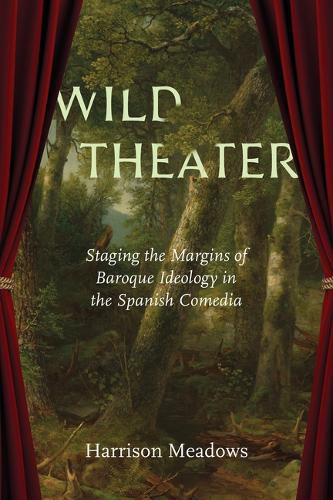Readings Newsletter
Become a Readings Member to make your shopping experience even easier.
Sign in or sign up for free!
You’re not far away from qualifying for FREE standard shipping within Australia
You’ve qualified for FREE standard shipping within Australia
The cart is loading…






In Wild Theater, Harrison Meadows critically examines the genealogy of one of world literature's most well-known figures: the "Wildman." From its earliest manifestations in works such as The Epic of Gilgamesh to more recent films like The Green Knight, the transhistorical figure of the Wildman has fascinated generations of scholars and the broader public for centuries. Despite this widespread interest, the place of the Wildman--and ideas of wildness more generally--have been underexplored in scholarship on the Spanish Baroque period. Wild Theater addresses this lacuna in scholarship by exploring the ideas of wildness in the Spanish comedia, a popular Spanish Golden Age theater genre that combined elements of tragedy and comedy. In five compelling chapters, Meadows argues that a major shift occurred during the Baroque period, whereby the largely positive quality of previous iterations in the genealogy of wildness take on a negative character in the cultural ethos--and that this fundamental shift was representative of the influence of Spanish colonialism on racial thinking and a larger set of changes in how early modern people viewed gender and class. In this way, the book identifies the wild figure's dramatic roots in the carnivalesque as an indispensable point of departure to plot the trajectory of wild representation in the theater of the Hispanic Baroque. From this guiding premise, Meadows traces the carryovers, transformations, and negations of the carnivalesque into early modern dramaturgy, specifically the Spanish comedia, which are emblematic of the poetic and ideological features of the emerging commercial theater in Iberia.
$9.00 standard shipping within Australia
FREE standard shipping within Australia for orders over $100.00
Express & International shipping calculated at checkout
In Wild Theater, Harrison Meadows critically examines the genealogy of one of world literature's most well-known figures: the "Wildman." From its earliest manifestations in works such as The Epic of Gilgamesh to more recent films like The Green Knight, the transhistorical figure of the Wildman has fascinated generations of scholars and the broader public for centuries. Despite this widespread interest, the place of the Wildman--and ideas of wildness more generally--have been underexplored in scholarship on the Spanish Baroque period. Wild Theater addresses this lacuna in scholarship by exploring the ideas of wildness in the Spanish comedia, a popular Spanish Golden Age theater genre that combined elements of tragedy and comedy. In five compelling chapters, Meadows argues that a major shift occurred during the Baroque period, whereby the largely positive quality of previous iterations in the genealogy of wildness take on a negative character in the cultural ethos--and that this fundamental shift was representative of the influence of Spanish colonialism on racial thinking and a larger set of changes in how early modern people viewed gender and class. In this way, the book identifies the wild figure's dramatic roots in the carnivalesque as an indispensable point of departure to plot the trajectory of wild representation in the theater of the Hispanic Baroque. From this guiding premise, Meadows traces the carryovers, transformations, and negations of the carnivalesque into early modern dramaturgy, specifically the Spanish comedia, which are emblematic of the poetic and ideological features of the emerging commercial theater in Iberia.